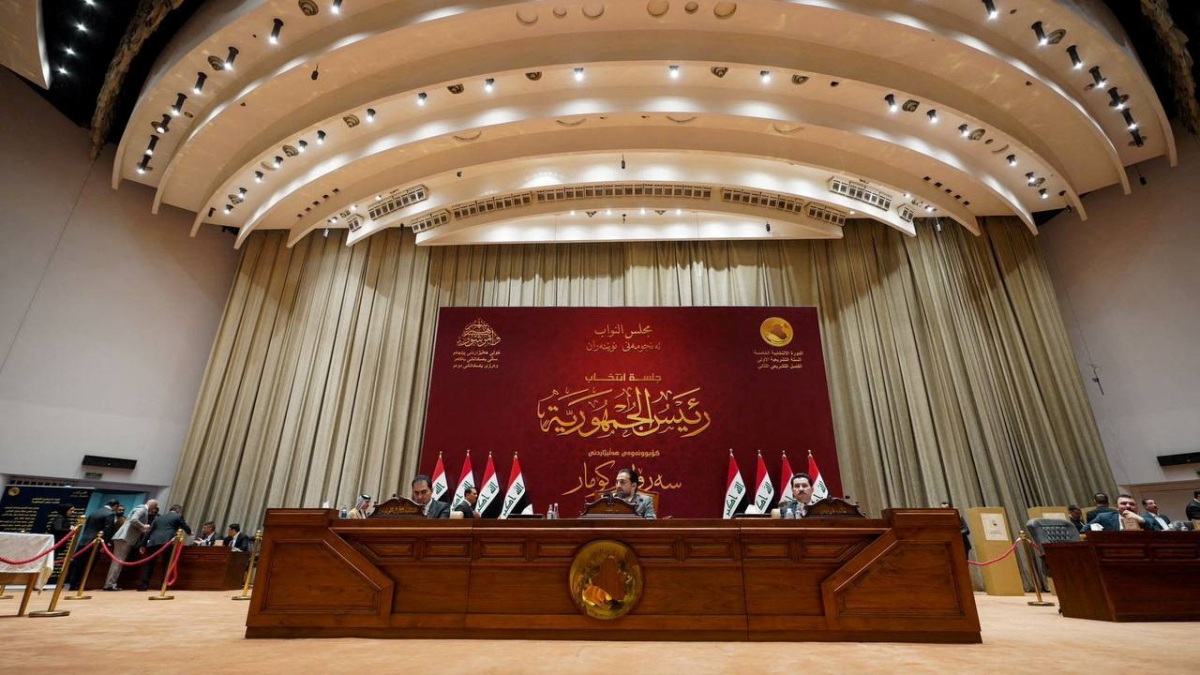Move will increase the size of electoral districts, a decision widely supported by the country’s Iran-backed Coordination Framework coalition.
Iraqi lawmakers passed controversial amendments to the country’s election law that could undermine the chances for smaller parties and independent candidates to win seats in future polls.
The amendments increase the size of electoral districts, a move widely backed by the Coordination Framework, a coalition of Iran-backed parties. The coalition forms the majority bloc in the current parliament, which brought Prime Minister Mohammed Shia al-Sudani to power last year.
The bill passed in a 206-12 vote in the 329-seat assembly, according to media reports. The remaining parliamentarians were absent from the hours-long session, which started on Sunday night.
The amendments also reverse key articles passed ahead of the 2021 federal election and redraw the electoral maps to have Iraq return to one electoral district per each governorate.
Several Iraqi political blocs and independent parliamentarians had rejected the amendments and stalled the vote for weeks. Hundreds of protesters gathered over the past weeks to voice their opposition.
Independent MPs who objected to the law walked out of a previous session, causing it to be postponed over a lack of quorum. They attempted to stall the vote again overnight by protesting and disturbing the count, before Iraqi security forces escorted them out of the assembly hall.
Al Jazeera’s Mahmoud Abdelwahed, reporting from Baghdad, said the vote is highly significant.
“It is a drastic change to the electoral law. Opponents say it gives influence to the major political parties at the expense of the smaller ones, especially those emerging after the 2019 protests,” he said.
“People have taken to the streets, especially in the southern provinces where many are against government corruption. They say they will not let this law be applicable.”
Burning tyres
On Saturday, hundreds protested in Baghdad against the new amendments while some demonstrators in other parts of Iraq blocked roads with burning tyres.
Iraq’s previous election law was adopted following mass anti-government protests in 2019. That legislation gave independent candidates and grassroots movements a better chance at winning seats.
Its drafting and the subsequent 2021 elections involved technical assistance from the United Nations. The vote was lauded as a “substantial achievement” by Jeanine Hennis-Plasschaert, the UN special representative to Iraq.
The outcome of that election shocked the Coordination Framework, which lost seats while its chief political rival, firebrand Shia religious leader Muqtada al-Sadr, was declared the clear victor.
Al-Sadr’s political bloc gained 74 seats in the 2021 polls, while the Fatah Coalition, made up of Iran-backed parties, lost nearly half of its votes and more than two-thirds of its seats, compared with the 2018 polls.
Despite emerging as the clear winner in the election, al-Sadr did not win a parliamentary majority needed to form the government. An alliance with Sunni and Kurdish parties fell apart after the religious leader, frustrated by months of political impasse, ordered his MPs to resign in a sudden move that many observers said was a miscalculation.
The move allowed his political rivals in the Coordination Framework to amass the needed parliamentary majority to form the government and name al-Sudani as prime minister.
Amending the electoral law and reversing the articles that effectively disempowered the ruling coalition from the vote emerged as a priority for the new government.
Iraq’s provincial elections are slated for November 6, the country’s first local vote in a decade. Independent candidates fear the elections under the new law will empower ruling parties, which they accuse of rampant corruption. The Iraqi government has not yet scheduled the country’s next general elections.
Source
:
Al Jazeera and news agencies

